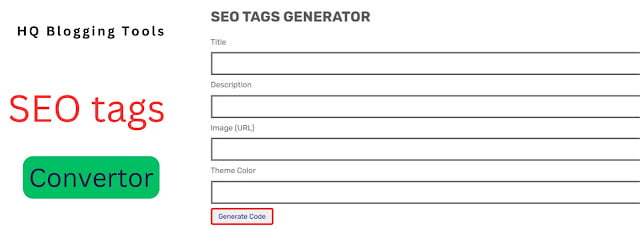Table Of Contents
SEO Tags Generator
Boost Your Website’s Ranking with HQ Blogging Tools Powerful SEO Tags Generator
If you’re looking to enhance your website’s search engine visibility and outrank your competitors, then you need to harness the power of SEO tags generator. As a proficient SEO and high-end copywriter, I understand the significance of optimizing your website with the right SEO tags to improve its organic ranking on search engine result pages (SERPs). In this article, we will delve into the world of SEO tags generator, exploring how it can benefit your website and provide you with actionable insights on how to use it effectively to boost your website’s ranking.
Understanding the Importance of SEO Tags
SEO tags are HTML elements that provide information to search engines about the content of a web page. They play a crucial role in helping search engines understand the relevance and context of your content, which in turn impacts your website’s ranking on SERPs. Properly optimized SEO tags can make your website more visible to search engines, resulting in higher organic traffic and improved search engine rankings.
Types of SEO Tags
There are various types of SEO tags that you can optimize on your website. Let’s take a closer look at some of the most important ones:
- Title Tags: Title tags are one of the most critical SEO tags as they appear as the headline of your web page on SERPs. Including your target keywords in your title tags can significantly impact your website’s ranking. It’s essential to keep your title tags concise, compelling, and relevant to the content of your web page.
- Meta Description Tags: Meta description tags provide a brief summary of the content of your web page. While they don’t directly impact your website’s ranking, they can influence the click-through rate (CTR) of your website on SERPs. Crafting compelling and relevant meta description tags with your target keywords can entice users to click on your website.
- Header Tags: Header tags (H1, H2, H3, etc.) are used to structure the content of your web page. They not only make your content more readable but also provide signals to search engines about the hierarchy of your content. Optimizing header tags with your target keywords can help search engines understand the main topics of your content and improve your website’s SEO.
- Alt Tags: Alt tags are used to describe the content of images on your website. Optimizing alt tags with relevant keywords can improve the accessibility of your website and provide additional SEO value.
- Canonical Tags: Canonical tags are used to indicate the preferred version of a web page when you have multiple pages with similar content. Properly implementing canonical tags can prevent duplicate content issues and consolidate the SEO value of your web pages.
- Robots.txt: Robots.txt is a text file that tells search engines which pages or sections of your website should not be crawled or indexed. Optimizing your robots.txt file can ensure that search engines are focusing on the right pages of your website, improving your website’s SEO.
- Open Graph Tags: Open Graph tags are used to define how your website’s content appears on social media platforms when it is shared. Optimizing Open Graph tags can improve the visibility and click-through rate of your content on social media, driving more traffic to your website.
Using SEO Tags Generator Effectively
Now that you understand the different types of SEO tags, it’s essential to know how to use an SEO tags generator effectively to optimize your website for search engines. Here are some actionable tips:
- Do Keyword Research: Conduct comprehensive keyword research to identify the most relevant and high-performing keywords for your website. Use these keywords strategically in your SEO tags to optimize your website’s content for search engines.
- Keep it Relevant: Ensure that your SEO tags are relevant to the content of your web page. Avoid stuffing keywords or using generic tags that don’t accurately reflect the content. This will help search engines understand the context of your content and improve your website’s ranking.
- Optimize Length: Pay attention to the length of your SEO tags. Title tags should ideally be between 50-60 characters, while meta description tags should be around 155 characters. Keeping your tags within these limits will ensure that they are displayed properly on SERPs and entice users to click on your website.
- Use Actionable Language: Write your SEO tags in active voice and use actionable language to make them more compelling. For example, instead of “Best SEO Tips,” use “Boost Your SEO with These Actionable Tips.” This not only makes your tags more engaging but also aligns with search intent, improving your website’s SEO.
- Test and Monitor: Use an SEO tags generator to create different variations of your tags and conduct A/B testing to identify the most effective ones. Monitor your website’s performance on SERPs and make adjustments as needed to continuously optimize your SEO tags for better results.
Conclusion
In conclusion, optimizing your website with the right SEO tags is a crucial element of effective SEO strategy. By using an SEO tags generator effectively, conducting keyword research, keeping your tags relevant and optimized in length, using actionable language, and continuously testing and monitoring, you can improve your website’s ranking on SERPs and outrank your competitors. Remember to always create unique and compelling content that provides value to your users, and follow best practices for SEO to achieve long-term success in driving organic traffic to your website.

